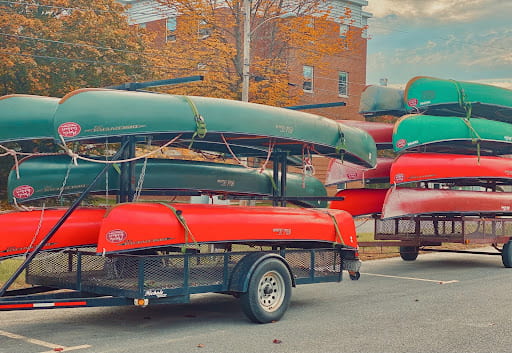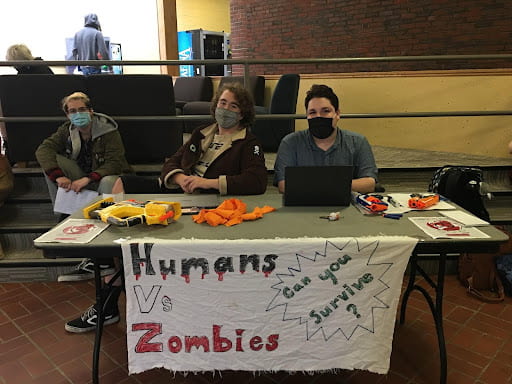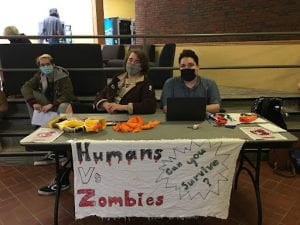
Nov 1, 2021 | Exclusive, Feature, Sports |
By Charity Webster, contributing writer
The current pandemic has really made UMF have to think outside the box in the sense of student body activities. This challenge has been extremely difficult due to the past and current restrictions on the students gathering together. Mainely Outdoors (MO) has great programs that students can be involved in and stay socially distanced without a mask. They offer so many COVID-friendly options at no cost to the students. If hiking is your game or if you like snowshoeing in the winter, Mainely Outdoors has you covered.
“We have all types of ability trips, beginner’s trips are the place for someone to learn something new” said Sam Shirley, Student Leader and Kat Robinson, Program Supervisor.
Mainely Outdoors was founded by James Toner, a man who loved the outdoors and wanted to bring that to the UMF student body. He was passionate about this club and the great state of Maine’s outdoor activities. Since then he has passed on this passion to other students like Sam Shirley.
“Sam is currently the passion of MO and why MO is so active at this time, he is the one to continue to drive the club, we are very thankful for the time and effort that Sam put in during COVID and keeping the program alive” Assistant Director of the Fitness and Recreation Center Allison Thayer said.
Shirley clears the paths and lawns at Prescott Trails, maintains the trails all year long, and is currently training Robinson to replace him after he graduates. He has been with MO since his Freshman year. He grooms the cross country trails, and preps and leads the weekly mountain biking trip. You can rent equipment of your choice at MO at no cost to you as long as you agree to return the equipment in a timely manner.
James Toner passed away in 2018, and his legacy lives on through Mainely Outdoors. His scholarship is given to a sophomore who demonstrates a passion for the outdoors and is in a related major. “This is a substantial and giving scholarship for students who may be in the Outdoor Program at UMF.” said Robinson
Activities that MO offers includes canoeing trips, kayaking, camping, mountain biking, and hiking. Winter is fast approaching and they will soon offer snowshoeing, hiking, rock climbing, cross country skiing, indoor ice skating, and some downhill ski trips.
“Leading hiking trips is Robinson’s favorite part about MO, and it’s getting a “bit chilly” for boating but they do rent canoes and kayaks.” said Robinson.
“The most popular activity is coming up November 13, to spend the day at Acadia National Park,” said Shirley. On this day trip to Acadia, they will take a driving tour through part of the park, stop at a variety of roadside stops, and do a few short hikes (< 3 miles). This trip is provided at no cost to students, and they provide the transportation! Be sure to register soon to reserve your spot as this is a popular trip.
Additionally, whenever there is a full moon, Robinson leads a local full moon hike.
Find information on the James Toner Scholarship by visiting the website: https://www.umf.maine.edu/alumni/the-james-toner-memorial-scholarship-fund/ Go to Mainely Outdoors Facebook page and LIKE it, to find out more on upcoming events! Mainely Outdoors is located at 114 Quebec St. Farmington, Maine or call 207-778-7373

Nov 1, 2021 | Exclusive, Feature |
By Lilly Johnson, contributing writer
You may notice students with orange armbands and nerf guns acting erratically on campus this week. No need to be alarmed, the Tabletop Gaming Club is resuming a long-time tradition of ‘Humans vs Zombies’ on campus.
After a three-semester hiatus due to COVID-19, roughly 80 students will engage in a team based game of tag. The goal of the zombies is to eliminate as many humans as possible and vice versa. Once a zombie has ‘infected’ a human, the human is now a zombie and part of that team. Humans can protect themselves with Nerf guns and sock grenades or flails which ‘stun’ the zombies and prevent them from tagging anyone else for 15 minutes. Beyond the basic premise of tag, there are also missions and other engagement events that gather the teams together.
There were a few rules to keep things safe and keep the peace on campus, including mandatory ‘timeout’ hours. The game is not in play on school nights from 12am-6am to encourage students to sleep. No one outside of the game is allowed to be involved by players. There are also certain areas on campus where the game is inactive for safety, such as roads,and places the game is inactive for part of the day such as the lawn near the daycare.
The Tabletop Gaming Club also hosts a spring event, but President Quinlan Boyle said that their fall event is far more popular and this fall especially so. The fall game of ‘Humans vs Zombies’ usually takes place the week before Halloween, but the spring game can take place anytime after the snow melts.

Quinlan and Juniper tabling in the Olsen Student Center on Thursday evening.
Nov 1, 2021 | Feature, Uncategorized |
By Ashley Ward, Contributing Writer.
What do you think UMF can do to be more mindful about its relationship with the land we use and its history with Indigenous tribes?
Grace ‘24: I think that having actual Native Americans that come and speak and give presentations instead of using our white voices to empower them would be better than just speaking for them. I feel like giving indigenous people the voice instead of just speaking for them is something that UMF is not the greatest at doing. I think they just need to include indigenous people instead of talking about them.
Farrah ‘25: Maybe just talk about it more. Like, advertise it more because I don’t really get any ads for anything, so I didn’t know that there were any events going on. And to just be more respectful of the land in general.
Will ‘25: Understand their culture, I guess. Compassion for where the land came from and that they [Indigenous tribes] were the first people here is also important.
Eme ‘24: Reaching out to people who are knowledgeable on the topic could help to get more respect on the land and more recognition that this is not our land.
Nov 1, 2021 | Feature |
By Annie Newman, Staff Writer
Even in October, the garden that sits next to the Student Olsen Center is teeming with life. Brilliant flowers bloom, vegetables ripen, and bees take pollen to ready themselves for winter. Students mill about, especially those that are in the “Dig It: Gardening for Change” class hosted by student advisor and teacher Gretchen Legler.
“What we do is we read people who are writing about how we need to change the way we grow food in America and across the world to make it less fossil-fuel dependent– so how we need to change the way we grow food and how we change the way we make food available to people,” Legler explained.
As well as reading and studying methods of change, students also work in the garden and donate the produce to put their lessons into practice. “We’ve worked in the garden, we planted things, we’ve nurtured things, we harvested things, and delivered them to [Saint Joseph’s] Nutrition Center, which is just up the street and is a free place for people to go 24/7 to get nutritious fresh food,” Legler said. St. Joseph’s Nutrition Center is also available to students.
Those that were on campus before the garden arrived may remember the Creative Writing building that stood next to the Student Olsen Center. But how did the garden come to be? “The garden was made possible by a grant from something called the Ella Lyman Cabot Trust,” Legler said. “It’s a Boston-based organization that likes to fund projects that help change the world for the better with an environmental focus. All of the wood here, the topsoil, the seeds, the greenhouse– it all was because of that grant.”
Legler has also detailed the different kinds of vegetables, herbs and flowers being grown in the garden: catnip, gourds, marigolds and more. “All of the work that has been done in this garden has been done by students. All of the building of the beds, the filling the beds with soil, starting all the plants, planting everything, taking care of it over the summer– it’s all been done by students,” Legler noted. Though deer have been nibbling at the growth that has been uncovered by the netting, the garden is considered a great success.
“I want people to know that they can come to the garden anytime and enjoy it,” Legler added. Most of the produce is reserved for food banks such as St. Joseph’s Nutrition Center and soon the Thrifty Beaver, but the garden is a good place to look at the growth and “rejuvenate your soul,” as Legler puts it.
If you are interested in an apprenticeship or work-study around the garden, contact Gretchen Legler at: gretchen.legler@maine.edu.
Nov 1, 2021 | Feature, News |
By Ashley Ward, Secretary and Assistant Editor
University of Maine at Farmington conducted a week of events surrounding issues affecting the Indigenous communities within Maine as a response to Indigenous Peoples’ Day on October 11. Several of the days following the holiday featured a different event dedicated to spreading awareness amongst the UMF community and members of the public.
Monday’s event on October 11 consisted of a virtual teach-in, where attendees were offered the chance to observe three short films: “The Penobscot: Ancestral River, Contested Territory”, “The Saga Continues”, and “Kihtahkomikumon (Our Land) – #IslandBack in Passamaquoddy Territory”. More information about these short films and links to watch them can be found at https://www.umf.maine.edu/diat/indigenous-peoples-week/.
The event held on Wednesday, October 13, was a comprehensive presentation and discussion on the meaning and significance of #LandBack, as well as water rights and decolonization within Wabanaki territory. The discussion was moderated by Executive Director of Bomazeen Land Trust Mali Obomsawin and Sunlight Media Collective member Lokotah Sanborn. The presentation was held by Penobscot Nation member Dawn Neptune Adams and Maine Indian Land Claims historian Maria Giouard. Together, the four speakers represent Penobscot and Abenaki communities, as well as Wabanaki led organizations.
Adams and Giouard discussed waste mismanagement in areas near to Penobscot and Passamaquoddy lands, the legal proceedings surrounding land claims, and current water quality issues at length during Wednesday’s event. Adams cautions that future wars will be fought over water, rather than oil.
“We protect the water, not for ourselves, but for the next seven generations,” Adams said.
On the evening of Thursday, October 14, an event was held on the Mantor Green by UMF College Democrats President Celia Canavan about the Missing and Murdered Indigenous Women and Girls. Students led a teach-in about this transgression and asked attendees to wear red as a sign of solidarity. A poster circulated by the UMF College Democrats states: “Their fight is our fight.”
A presentation and discussion was led on Friday, October 15, by Associate Professor of Anthropology at the University of Maine Darren J. Ranco of Penobscot Nation. Ranco discussed decolonization at campus level and what that entails, as well as how it affects members of the UMF community. Ranco also introduced the topic of Traditional Knowledge Labels and their importance within Indigenous communities.
During Indigenous Peoples’ Week at UMF, an Indigenous Land and Water Acknowledgement was unveiled. Written by Obomsawin and Ranco, UMF’s Indigenous Land and Water Acknowledgement addresses the history of the space the UMF campus occupies and the effects of colonization on surrounding lands and their people.
For more information about the events, the presenters, or UMF’s Indigenous Land and Water Acknowledgement, visit the site found at: https://www.umf.maine.edu/2021/10/umf-recognizes-indigenous-peoples-day-with-week-of-events-exploring-issues-vital-to-the-wabanaki-people/.


